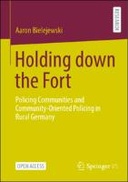Explore

This Open-Access-book questions the relationship between institutionalized images and understandings of policing – the monolithic ideas common to most, if not all, Western law enforcement agencies – and contextual, situative, and local interactions where the human representatives of policing – street-level officers – come into contact with residents. The political and theoretical association of specific forms of “Western” policing with democratic society can be illustrated in the case of German integration: narratives of reform and essentially forging new democratic police agencies in the “new German states” stand at odds with much of the experience and statements of officers who continued to serve following (Re)Unification. Officers who present their works primarily in terms of their local responsibilities, expectations and more specifically to their unique and individual relationship and connection to their communities downplay the relevance of high-level policing policy. Based on a two-year ethnographic study of policing in a rural county in the German state of Brandenburg, this book explores the local nature of policing both in terms of how police officers imagine their communities to be and with reference to broader societal expectations and assumptions of what police, essentially, are, can effectively do, and should effectively do.
This book is included in DOAB.
Why read this book? Have your say.
You must be logged in to comment.
Rights Information
Are you the author or publisher of this work? If so, you can claim it as yours by registering as an Unglue.it rights holder.Downloads
This work has been downloaded 70 times via unglue.it ebook links.
- 70 - pdf (CC BY) at OAPEN Library.
Keywords
- Community policing
- Crime & criminology
- dramaturgy
- ethnography
- Jurisprudence & general issues
- Law
- Law & society
- policing
- Policing in Germany
- Rural communities
- Social services & welfare, criminology
- Society & Social Sciences
Links
DOI: 10.1007/978-3-658-39773-9Editions

